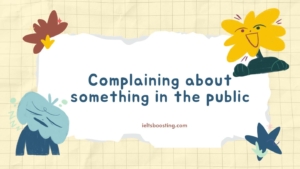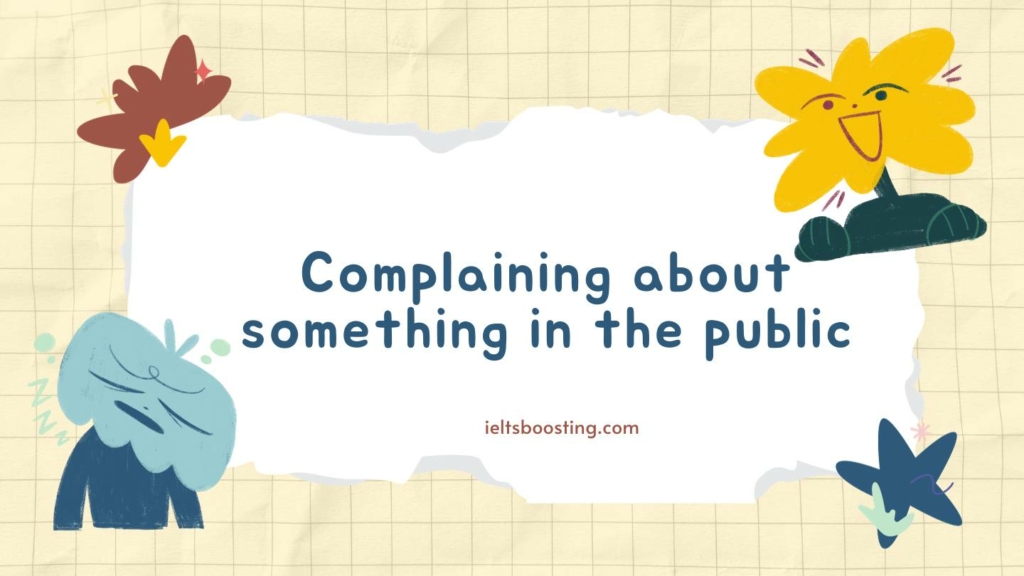Describe an occasion when you met someone complaining about something in the public (in the restaurant or other place)
You should say:
When and where it happened
What he/she complained about
What the result was
And explain how you felt about the experience
Can use sample Describe a time you received bad service in restaurants/shops

Describe an occasion when you met someone complaining about something in the public
Sample answer
I’m going to talk about an occasion when I met someone complaining about something in public. It happened a few months ago, when I went to a restaurant with my friend for lunch. The restaurant was quite busy and we had to wait for a while to get a table. We didn’t mind that, because we were not in a hurry and we had a lot to chat about.
However, there was a man sitting next to us who seemed very impatient and unhappy. He kept complaining to the waiter about everything: the food, the service, the noise, the price, etc. He was very rude and loud, and he made the waiter feel very uncomfortable and embarrassed. He even asked to speak to the manager and demanded a discount or a free meal.
The result was that the manager came and tried to calm him down, but he was not satisfied and he continued to complain and argue. He made a scene and attracted a lot of attention from other customers. Some of them looked annoyed, some of them looked amused, and some of them looked sympathetic.
I felt very sorry for the waiter and the manager, because they had to deal with such a difficult customer. I also felt a bit angry and irritated, because he ruined the atmosphere and disturbed our lunch. I thought he was very unreasonable and disrespectful, and he should have been more polite and understanding. I wondered what made him so unhappy and dissatisfied with life.

Describe an occasion when you met someone complaining about something
Part 3-Describe an occasion when you met someone complaining about something in the public
Do you think complain is important for business?
I think complaining is important for business, because it can help businesses improve their products or services, and also increase customer satisfaction and loyalty. Complaining can also be a way of expressing one’s opinions and preferences, and sometimes it can lead to positive changes or innovations.
Some useful vocabulary for this topic are:
- constructive criticism: comments that are intended to help someone improve something
- complaint: a statement that something is wrong or not satisfactory
- resolution: the act of solving or ending a problem or difficulty
- refund: an amount of money that is given back to you, especially because you are not happy with a product or service that you have bought
- compensation: something, usually money, that somebody gives you because they have hurt you, or damaged something that you own; the act of giving this to somebody
- apology: a word or phrase that you use to show that you are sorry for doing something wrong or for causing a problem
- dissatisfaction: the feeling of being unhappy with something or someone; the feeling of not being satisfied
- improvement: the act of making something better; the process of something becoming better
Do you think it’s important for a business company to train their employees to react to the customer’s complaints?
I think it is very important for a business company to train their employees to react to the customer’s complaints, because it can affect the reputation and performance of the company. Customer complaints are inevitable in any business, and how the employees handle them can make a big difference in customer satisfaction and loyalty. If the employees are well-trained and equipped with the skills and knowledge to deal with customer complaints effectively, they can resolve the issues quickly and professionally, and prevent the complaints from escalating or damaging the company’s image.
On the other hand, if the employees are not trained or prepared to handle customer complaints, they may respond inappropriately or rudely, and cause the customers to lose trust or confidence in the company, or even take legal action against the company.
Some useful vocabulary for this topic are:
- resolution: the act of solving or ending a problem or difficulty
- refund: an amount of money that is given back to you, especially because you are not happy with a product or service that you have bought
- compensation: something, usually money, that somebody gives you because they have hurt you, or damaged something that you own; the act of giving this to somebody
- apology: a word or phrase that you use to show that you are sorry for doing something wrong or for causing a problem
- dissatisfaction: the feeling of being unhappy with something or someone; the feeling of not being satisfied
- improvement: the act of making something better; the process of something becoming better
- feedback: information or opinions about something, such as a new product, that can tell you if it is successful or liked
- constructive criticism: comments that are intended to help someone improve something
- customer service: the way that a company deals with customers before, during, and after a sale, and the activities involved in dealing with customers
Do you think are complaint is better to speak to someone or write it down like in an email?
I think there are advantages and disadvantages of both speaking and writing a complaint, depending on the situation and the person’s preference. For example, speaking a complaint can be more direct and immediate, and it can allow for a dialogue and feedback between the complainer and the receiver. However, speaking a complaint can also be more emotional and confrontational, and it can be hard to remember or prove what was said later. On the other hand, writing a complaint can be more formal and polite, and it can provide a written record of the issue and the resolution. However, writing a complaint can also be more time-consuming and impersonal, and it can be misunderstood or ignored by the receiver.
Some useful vocabulary for this topic are:
- complaint: a statement that something is wrong or not satisfactory
- resolution: the act of solving or ending a problem or difficulty
- refund: an amount of money that is given back to you, especially because you are not happy with a product or service that you have bought
- compensation: something, usually money, that somebody gives you because they have hurt you, or damaged something that you own; the act of giving this to somebody
- apology: a word or phrase that you use to show that you are sorry for doing something wrong or for causing a problem
- dissatisfaction: the feeling of being unhappy with something or someone; the feeling of not being satisfied
- improvement: the act of making something better; the process of something becoming better
- constructive criticism: comments that are intended to help someone improve something
- customer service: the way that a company deals with customers before, during, and after a sale, and the activities involved in dealing with customers

